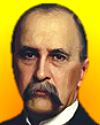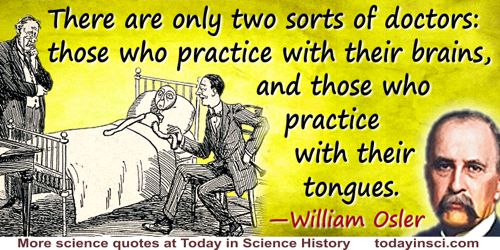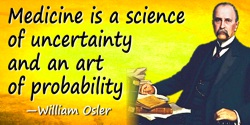 (source)
(source)
|
Sir William Osler
(12 Jul 1849 - 29 Dec 1919)
Canadian physician, medical educator and author whose clinical teaching, research and personality strongly influenced medical practice, including encouraging a warmer bedside manner between doctors and their patients. He wrote Principles and Practice of Medicine (1892), one of the most successful textbooks in medical history.
|
William Osler
“Two sorts of doctors”
Illustrated Quote - Medium (500 x 250 px)

More William Osler quotes on science >>
When William Osler gave an address to McGill Medical School on 1 Oct 1894, entitled “Teaching and Thinking” his subtitle was “The Two Functions of a Medical School.” He praised the “remarkable increase in his physical well-being.” In particular, he recognized that
Anæsthetics and antiseptic surgery have almost manacled the demon.
Later in his talk, he said “Though used less frequently, medicines are now given with infinitely greater skill.” He then considered the qualities of doctors who avoid “nostrums and humbuggery”:
Many of the difficulties which surround the subject relate to the men who practise the art. The commonest as well as the saddest mistake is to mistake one’s profession, and this we doctors do often enough, some of us, without knowing it.
There are men who have never had the preliminary education which would enable them to grasp the fundamental truths of the science on which medicine is based.
Others have poor teachers, and never receive that bent of mind which is the all important factor in education; others again fall early into the error of thinking that they know it all, and benefiting neither by their mistakes or their successes, miss the very essence of all experience, and die bigger fools, if possible, than when they started.
There are only two sorts of doctors; those who practise with their brains, and those who practise with their tongues.
The studious, hard-working man who wishes to know his profession thoroughly, who lives in the hospitals and dispensaries, and who strives to obtain a wide and philosophical conception of disease and its processes, often has a hard struggle, and it may take years of waiting before he becomes successful; but such form the bulwarks of our ranks, and outweigh scores of the voluble Cassios who talk themselves into, and often out of, practice.
- Science Quotes by Sir William Osler.
- 12 Jul - short biography, births, deaths and events on date of Osler's birth.
- Sir William Osler - Excerpt from 'Books And Men' address (12 Jan 1901)
- William Osler - context of quote “Two sorts of doctors” - Large image (800 x 400 px)
- William Osler: A Life in Medicine, by Michael Bliss. - book suggestion.








